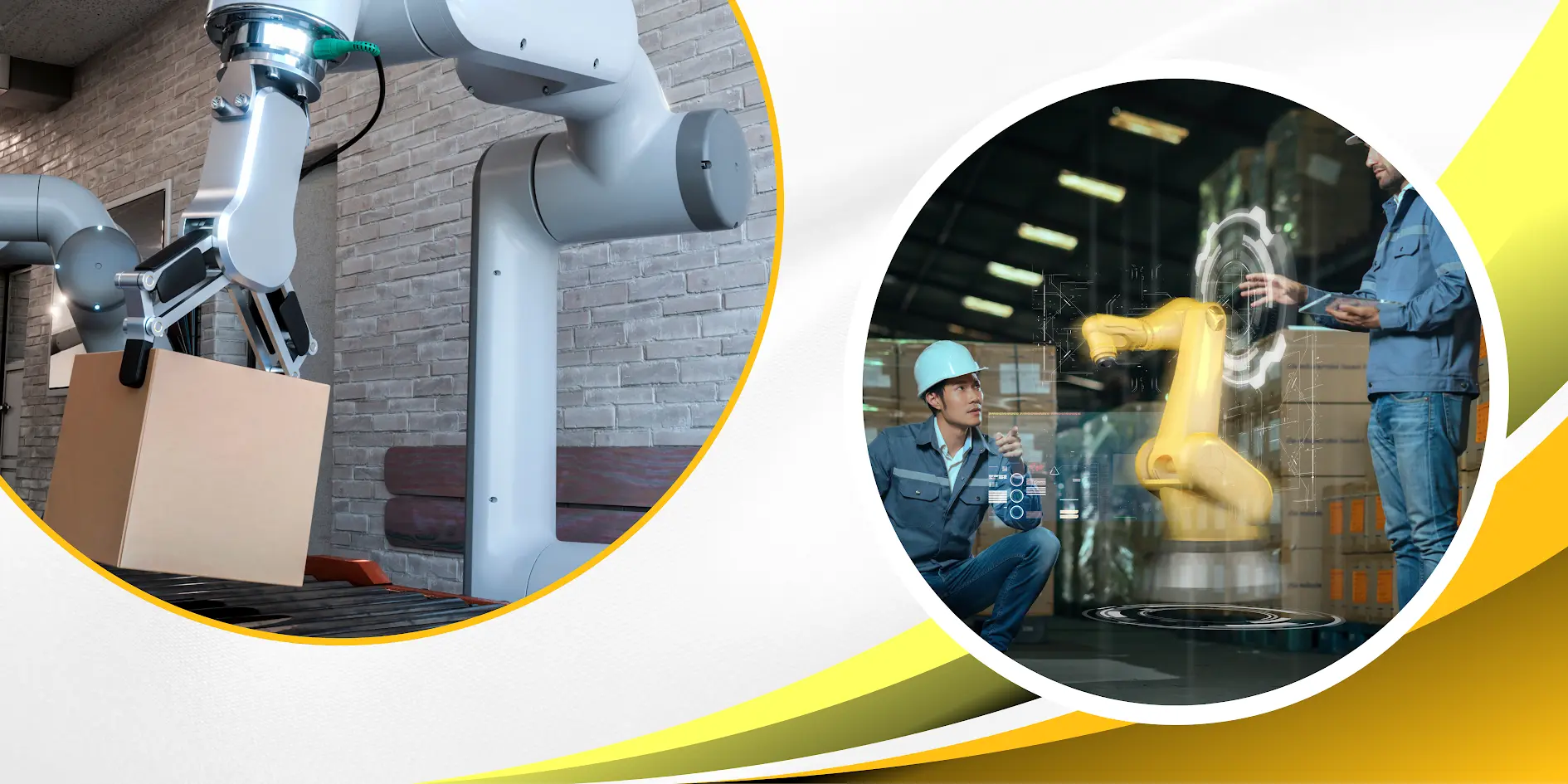June 27th, 2025
Category: Uncategorized
No Comments
Posted by: Team TA

The modern factory floor rapidly develops into a hub of intelligent automation and data-driven decision-making through artificial intelligence (AI). It equips teams with digital tools and real-time insights, allowing them to identify inefficiencies, minimize errors, and enhance communication throughout the production process.
The Role of AI in the Factory Floor for Manufacturing
AI plays a crucial role in areas like predictive maintenance and quality control, boosting safety, reliability, and sustainability. Manufacturers in the World Economic Forum’s Global Lighthouse Network have reported impressive results, including a 66% reduction in defect rates, over 50% less downtime, and significantly shorter production lead times. This blog explores how artificial intelligence is transforming manufacturing facilities and elevating the standard for operational excellence.
1. Predictive Maintenance: Keeping the Machines Running
AI models can predict possible equipment failures before they occur by examining real-time machine activity and historical sensor data. According to Deloitte, this proactive approach helps manufacturers prevent unplanned breakdowns, cut downtime by up to 50%, and save 20% on maintenance expenses.
AI-powered real-time monitoring systems produce automated alerts, allowing maintenance crews to take preventative action. By reducing interruptions, these solutions not only increase the lifespan of machines but also guarantee more efficient production schedules and increased profitability.
2. Quality Control: Detecting and Reducing Defects
The value of a brand and customer trust is dependent on maintaining constant product quality. Through the analysis of product images during production, AI-powered deep learning models help with the detection of defects. This speeds up the process, decreases the need for manual inspection, and lowers the possibility of mistakes.
3. Process Optimization: Improving Production Speed and Accuracy
By detecting inefficiencies in cycle times, energy consumption, and material waste, artificial intelligence (AI) assists manufacturers in increasing production. Machine learning improves inventory control, forecasts demand, and simulates processes. These insights lead to better resource use, lower costs, and higher productivity, which are crucial for staying competitive in today’s market.
4. Smart Product Design: Creating Better and Faster Innovations
For manufacturers, creating new products that meet changing consumer demands is a constant challenge. By evaluating vast datasets of previous designs, materials, and performance metrics, artificial intelligence, particularly generative AI, is revolutionizing product design and producing innovative and effective solutions.
AI-powered generative design tools explore a variety of design possibilities while optimizing for sustainability, cost, and performance. Furthermore, AI facilitates product simulation and material selection, enabling teams to test and improve products virtually before production.
5. AI-Powered Training: Upskilling the Workforce
Although a skilled workforce is necessary for manufacturing, closing skills gaps remains challenging. AI is essential in tackling this through intelligent training programs that improve memory and learning.
Employees can get immersive, hands-on training in a risk-free setting with AI-powered VR and AR simulations. AI also makes it possible to analyze skills gaps and create customized learning paths, which guarantees effective and focused training. This method decreases overall training expenses and time while increasing employee competency.
6. Supply Chain Optimization: Boosting Efficiency and Reliability
In manufacturing, handling a complicated supply chain with numerous moving components is an endless task. AI provides real-time insight into supplier performance, logistics, and inventory, which helps to streamline these processes.
AI forecasts demand, suggests trustworthy vendors, and streamlines delivery routes through predictive analysis. The result is faster response times, reduced costs, and improved supply chain resilience.
Key Benefits of AI-Powered Smart Manufacturing
The manufacturing industry is undergoing a transformation, driven by the power of artificial intelligence (AI). With advancements in technology, factories are becoming smarter, more efficient, and highly automated. AI is not just optimizing production lines—it’s reshaping how manufacturers approach quality control, maintenance, and overall operations. In this section, we’ll explore the key benefits of AI-powered smart manufacturing and how it’s setting the stage for a new era of innovation.
1. Enhanced Productivity and Efficiency
By predicting equipment failures before they happen, lowering unscheduled downtime, and guaranteeing more efficient operations, artificial intelligence (AI) increases manufacturing productivity. Real-time monitoring enables predictive maintenance, which keeps machinery operating effectively.
AI also improves production schedules, inventory control, and supply chain tracking, which all help to streamline workflows. Additionally, autonomous robots perform monotonous jobs, boosting productivity and freeing up employees to concentrate on higher-value duties.
2. Improved Quality Assurance and Facilitating Scalability
By employing computer vision to identify flaws in real time, AI improves quality control by being far more accurate and reliable than human inspectors. This lessens waste and safeguards the reputation of the brand by ensuring that only high-quality products are delivered to consumers. By spotting possible problems early, reducing downtime, and prolonging the life of machinery, predictive maintenance further increases reliability.
In response to changes in demand, AI systems dynamically adjust production schedules and resources, which facilitates scalability. Without compromising productivity or product quality, manufacturers can react swiftly to changes in the market.
3. Empowering the Workforce
By automating repetitive tasks, artificial intelligence (AI) in smart manufacturing empowers workers and frees them up to concentrate on strategic and innovative work. Through real-time guidance and AI-powered tools, it also improves safety and training, fostering skill development and raising job satisfaction without taking the place of human roles.
Looking Ahead
AI’s transformation of the factory floor is a strategic evolution rather than merely a technological advancement. AI is helping manufacturers increase productivity, cut costs, and streamline processes in a variety of areas, from supply chain optimization and smart robotics to predictive maintenance and quality control. In an industry that is changing quickly, these solutions are helping businesses remain flexible and competitive.
New developments like IoT integration, AI-powered robotics, and machine learning are accelerating this change. While AI promotes mass customization and sustainability, cognitive automation is enabling more intelligent production lines. All these advancements are pointing factories in the direction of a future that is smarter, more flexible, and more effective. Get in touch with Travancore Analytics now to find out how AI-powered manufacturing solutions can help your company.